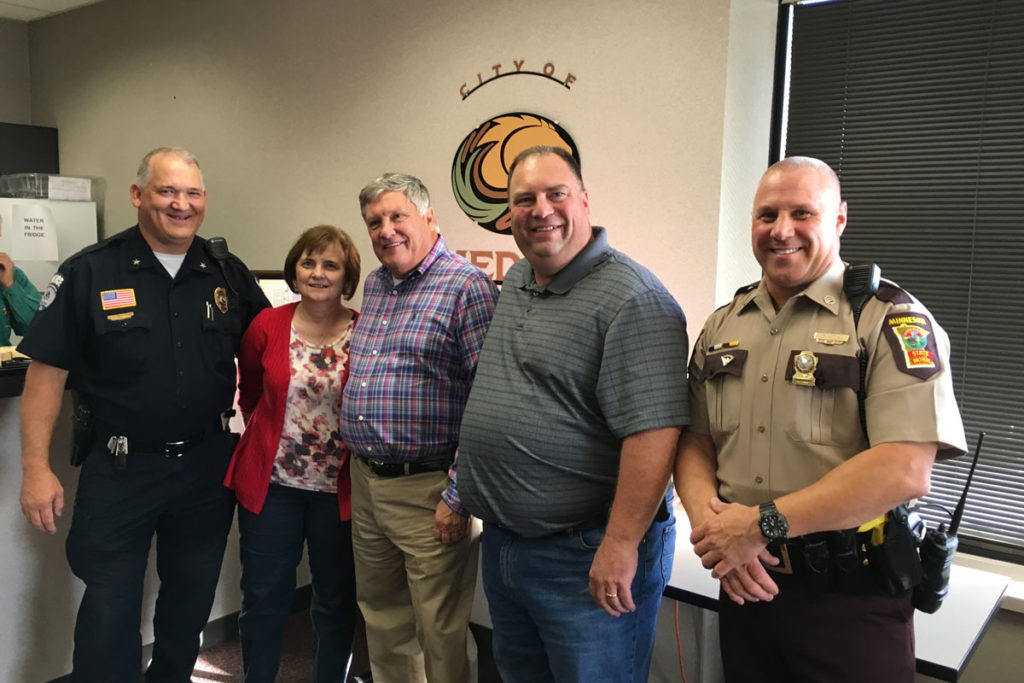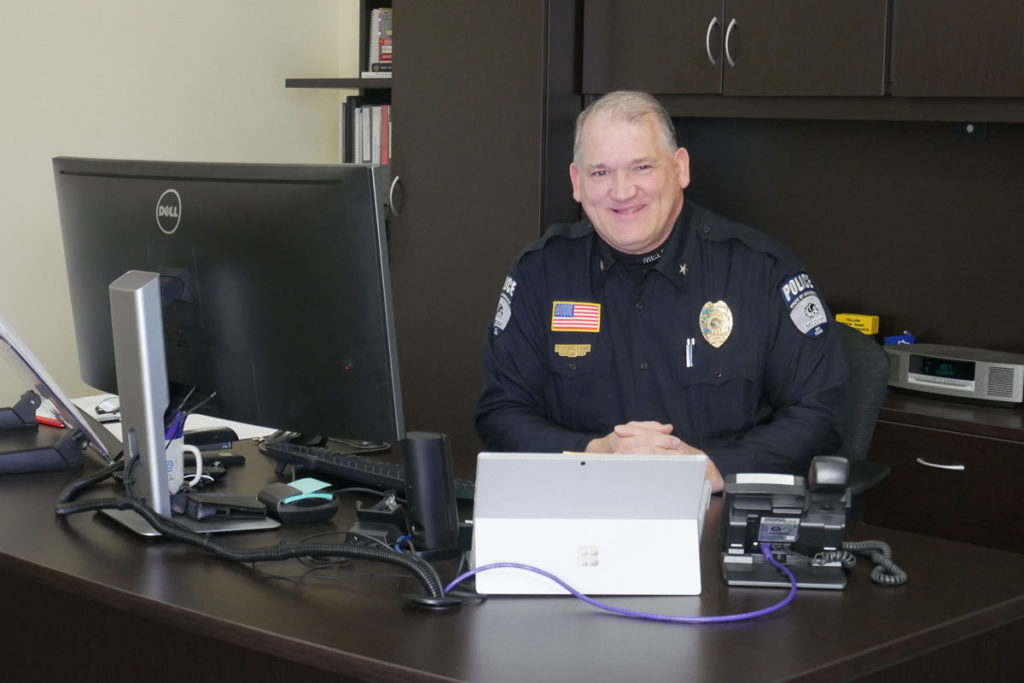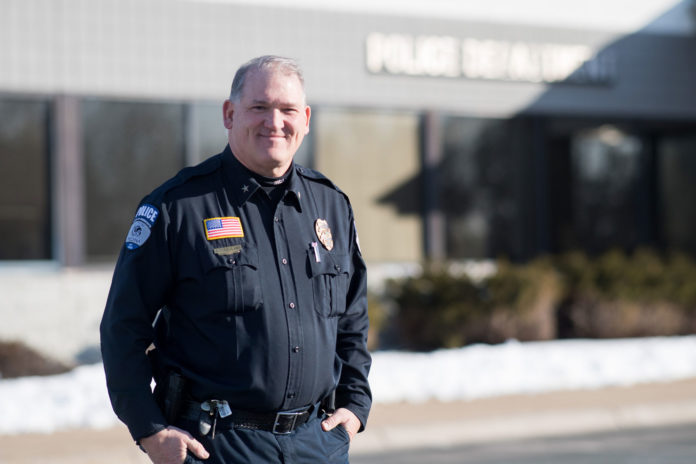Ed Belland joined the Medina Police Force on August 5th of 1991. Six years later, he went from filling a temporary void of Chief to formally applying and becoming the Chief of the Medina Police Department. At only 32 years old, this made Ed one of the youngest in his position; when he retires on March 31, 2020 he will have served over 23 years as Chief, currently the longest standing in his position in Hennepin County.
Where It Began
“I was 16 years old and with another kid on the wrestling team,” Ed smiles as he reflects. “We had four guys in the car and were going to a basketball game in Elsworth, Wisconsin. One of my friends was driving. We picked up some beer on the way down. There was a one way street in Elsworth and he drove down it the wrong way. We got stopped, the cops pulled us out of the car, placed the two 12 packs on top of it. Just then the spectator bus drove by.”
Ed laughs. “It wasn’t real good, and my parents knew about it because they were sitting in the bar where a scanner was going when they ran our names across the radio,” He pauses a moment, “The cops treated us fair though; really decent. They gave us tickets and did what they had to do. I didn’t think anything bad about them because we were the idiots doing the wrong thing. I walked away thinking, ‘I could do this job.’ From that point on, I looked at schools and applied.
I always say, ‘I went into law enforcement because I got arrested.’ He laughs again, but his genuine demeanor make it hard to tell if this is a schtick or the honest truth, though I am going to go with the latter. After all, after over 23 years as the Police Chief of Medina, Ed Belland is a pillar of goodness, a shining example.
The Pride and Empathy of the Job Prior to Chief
When asked what he may have done differently with his career, Ed said he would have considered waiting longer to apply for the position of police chief.
“In the six years of being a cop, I felt I was on top of my game as far as being a patrol. I knew the City like the back of my hand, I knew the procedures and policies, I knew every crack in the roads. I probably should have continued with that another 7-10 years prior to becoming a chief.”
Ed also reflected on his time as a community service officer (CSO). “I filled my personal file with tons of thank you notes. You unlock car doors, you find dogs, it was all positive, everyone loves the CSO.
“When you go into law enforcement you don’t make a lot of friends. You’re now writing tickets for speeding, for parking, for DWI, so it had always been my objective when I wrote people tickets to get a thank you for it. Believe it or not, 80-90% of people thanked me by the time I was done. You walk up and say, ‘you know why I’m stopping you?,’ Yeah I was going a little fast – ‘You know we’re seeing car accidents along here all the time, I don’t want you to get hurt. I need to write you a ticket.’ Thank you very much, we’ll slow down.”
He then recalls another memory five years after getting pulled over with his four buddies. “The other thing that helped me was when I was 21 driving through Saint Peter to Mankato, to see my girlfriend at the time. I was going 65 in a 55 when a State Trooper pulled me over. I was working part time, and had driven down from Baldwin and we were talking, and I was wondering if he was going to give me a warning or a ticket, and when he handed me the citation he said, here you go. And I thought, ‘Thanks a lot.’ To this day I’ll never forget the feeling I had when I got that ticket. It sucks, it affects your driving record, it affects your insurance, it’s not fun. But then, every ticket that I write has an effect on me, I know what it feels like. It was a great prerequisite to be able to take and learn from that experience. When people call and complain about getting a ticket, I say I can relate. It’s a life lesson, but I can’t tell you how valuable that life lesson was because I totally understand where you’re coming from. When I pull people over, I tell them, we all make mistakes, the best thing to do is to learn from it, you’ll make it through this but you need to change your behavior. My golden rule, treat people the way you’d want to be treated in that situation. And you know what? I don’t speed through Saint Peter anymore!””
Integrating these personal experiences, delivered with empathy to the citizens with whom he engages, is a noble and admirable trait in an officer. But with someone like Ed, it doesn’t stop there. After all, when you’ve been a Police Chief as long as he has, interacting with the public is only one part of the job.
Hiring and training a generation of officers for an entire city is an entirely different challenge in and of itself, especially when you consider that every single police officer currently working for the City of Medina was hired by Chief Belland.

Leading to Serve with a Balanced Force
From 2000-2007, a limited number of positions within the department meant limited opportunities. “People were coming and going. They’d be here for four to five years and they’d want more but we had no place to put them.” Through time, Chief Belland created and changed roles to encourage tenure within Medina’s force. “Now we have a sergeant and two investigators, and we rotate through the drug task force.” He has also streamlined the interview process, saving himself and the City time and money. “One of my favorite questions is, ’The law has the spirit of the law and the letter of the law. There is no right answer, tell me where you fit on that scale and why?’ It showed us if they could communicate, can they understand where we were coming from and how did they fit in on that thought process? It worked really well, if someone came in and didn’t have a clue, we could eliminate them right off the bat before going through the long interview process.”
Differing viewpoints is seen as an integral necessity by Chief Belland. “I have officers that work by the letter of the law and officers by the spirit of the law, they don’t always see eye to eye. One works by the law, the other guy plays in a grey field, takes more consideration and looks more at the totality of the circumstances. If I had a department filled with one point of view, it wouldn’t work. We need to have a good combination to balance it out.
“I’m not someone who takes a lot of credit, but it’s my expectation to treat someone fairly. I’m honest, I don’t hire perfect people, I hire honest people. I tell them (new hires) my story of getting arrested. I’m not going to hide that or say I’m perfect – we all make mistakes and we learn from it; you grow from it and you move on. You treat people the way you’d want to be treated if you were in that situation. This is a service position. People say cops are power hungry — I get really defensive because that’s not what it’s about. It’s about serving people and making a place safer, and when someone is hurting, we’re going to be there and help them. That’s always been my philosophy. We’re there to help people in their worst times.”
As Ed continues to talk, it’s abundantly clear he believes in what he has done and takes pride in the deliberate and thoughtful approach he has taken as well as the ethical standards he has maintained in his career. He takes offense when the news media paints the profession in an otherwise disingenuous light.
“The ethics we need to carry every day…you violate those ethics, you not only lose your reputation, you lose your job. You have to live it. I’m not saying all cops are good, there are bad cops out there too. But the overwhelming majority are good people that really want to make a difference. They go into this work to help people. It hurts the good cops when much of the news media is looking to pick apart cops.
Trying to be Perfect in an Imperfect World
Ed recalls a particularly tragic incident and almost begins to tear up, “I think back over my career, one that hits hard is when Connor Cook was killed; he was three years old and killed in a car accident. It is impressed in my mind. When I got there (to the accident scene), his little shoe was sitting there on the seat. You never get that out of your mind. You see the worst and you see the best. It’s a great job, but I was told by an experienced officer when I started, you are sitting in the front row, you see the good the bad and the ugly, you are the one that’s called when there is trouble.
“The officer who shot the woman in south Minneapolis screwed up, he was scared and for whatever reason he pulled the trigger and he killed someone. Did he do it intentionally? Two weeks ago we had a fatal at 55 and 101. A semi truck driver ran a red light and killed someone. What is the difference? She was going too fast and didn’t pay attention to the red light, she screwed up and killed him. But she isn’t a cop, she didn’t get prison time for 15 years. It still results in a death, but we’re held to a higher standard because of our ethics. I struggle with that too, does she deserve a penalty? Absolutely, but we have people kill people all the time on the highway and they get five years or less. What’s right, what’s wrong?”
He pauses, thinks a moment before explaining how the media and the internet have changed the public’s thought process in regards to his profession. “The system isn’t perfect. It’s not easy to be a cop. When I was hired in 1991 there were 301 applicants for the position I applied for. Today we’re hiring for two positions and had 36 apply. Who would want to be a cop?
“I’ve been in very few physical confrontations throughout my career, but if you’ve ever been involved in a physical confrontation with someone where you have to take control of them and they’re fighting to the death, you don’t realize how hard that is. I have an advantage because I was a wrestler; I know how to put people on the ground and I know how to control them. But when there’s a use of force situation and you have to fight someone hands on, I can’t tell you how hard that is, how much energy that takes, especially if they’re bigger than you are. What you have to do to accomplish that goal. Then you have somebody videotaping, you’re using all your strength just to control this person, and they put it in the ten o’ clock news. People don’t hear everything that led up to that confrontation. They only hear the reporter talking about the cop hitting or punching a person, when he is trying to control the person who is out of control. If you had to literally grapple someone to get control and you’re using every bit of your strength to do it, yeah, you might hit or punch someone because you’re fighting for your life. That’s the reality.”
“In 1995 I got into a fight with a Minneapolis cop in the Medina Entertainment Center ballroom. He had a restraining order against his ex-wife and they were having their class reunion. He showed up and slapped her across the face, so I went up to escort him out. We’re walking halfway across the ballroom when he pulls his arm away from me, screaming obscenities at me. so I grabbed him and had to control the situation. When I put him up against the wall, I didn’t mean to do it, but when I did it his glasses broke and slit him across his forehead. And then all I heard was him saying, ‘you’re getting sued! You’re getting sued!’ And the guy is drunk and violating the restraining order, but it’s my job to protect the ex-wife and everybody else. Then all I could think about for the next six months is, when is the lawsuit coming? I didn’t intend to cut his head, but I had to control the guy. No one else was going to do it, that’s what makes the job hard. Everyone has the right to sue.”

Professional gets Personal
After hearing too many of Ed’s stories to print, the psychological stress police officers are constantly subjected to became both glaringly apparent and quite personal.
“One of the good things I saw during the Obama administration was adding mental health help for officers. I hate to admit it, but I went through a divorce and it had a lot to do with the job. There was a period in my life when I would come home from work exhausted, I’d go up and lay on the couch, my wife (at the time) would bring me supper, then I would eat and go to bed. You just never got over it. You go to a death scene, and I would tell her I’d need a couple days to process it. Those visions don’t go away, they’re in your head, you work through it and life goes on. It’s not normal. Normal people don’t have to go in and pick up dead bodies and people’s parts.
“After my divorce, I went to a counselor when I should have…” he pauses, ‘though I should have gone to counseling before we made the decision to divorce. At the time, I felt like as police we are supposed to solve problems, we’re supposed to fix things, we’re supposed to be perfect. Psychologically I was struggling, I thought I screwed up, I was throwing my life away, I was wrecking my kids. We met about three times before my counselor looked at me and said, ‘Ed, you’ve got this all wrong. 50% of people in this world get divorced, you happen to be on this side. You lived your 23 years of marriage, you have your memories, you have your two kids. You didn’t lose it. You need to look at it as you turned the page and you’re going to the next chapter of your life.’ It was like a lightbulb went off, oh wow, she’s right! But we beat ourselves up so bad because we’re supposed to be the heroes. We’re not supposed to screw up.
“It was a life lesson, so I use that. I see somebody going through trouble with just about anything, their kids are in trouble, or they’re dealing with alcoholism, I encourage them to get some help. There’s so many issues dealing with this job, you always need some outside perspective. It made a huge difference in my life.
“As part of the Obama administrative change, it made counseling a priority, now there is mandatory training on what cops have to deal with, 16 hours every three years. Part of the 16 hours is dealing with people with mental illness, but also dealing with what the officers deal with and how to handle it. We kill more officers through suicide than we do in this country through accidents or murders, it’s two to one. I think I’m coming off pretty healthy, but it’s a road for everybody.”
From Squad Cams to Body Cams to Gun Cams
In the last decade with the proliferation of social media, rage culture and the 24/7 sensational news entertainment machine, I asked Ed about how body cams are affecting his profession.
“In ‘96 when we went to squad cams, all the officers were paranoid, but I told them, ‘This is not for discipline, this is for our protection.’ And guess what? Our complaint files went way down. Before I was Chief we had complaint after complaint, people could make up whatever they wanted. It used to be someone’s word against ours ~ you could write someone a ticket and they would complain. As soon as the body cams came, I would get a call, let them know I would view the video, they would say, ‘you’ve got this on video?’ and then I would never hear from them again. The videos took care of 99% of our complaint files.
“On the other hand, I am very fiscally conservative and I don’t want to spend $50,000 on storage of data. That’s why we went with the gun cams last year, which have an 8 hour recording ability in the guns disk so if an officer pulls a gun, the camera comes on and is going to catch the most important part as to why someone is pulling that gun with audio and video and we don’t pay anything for storage. The gun cams cost $7,000. Between the squad cams and the gun cams, we’re catching about 85% of the incident. The other 15% is important that leads to why the gun was pulled, in the next two to three years Medina will have body cams.”
What will Ed miss most?
Though the inherent psychological challenges of the job and the repetitious paperwork and bureaucracy will likely not be missed by Ed, he is quick and forthcoming to describe what he will miss most when he retires this spring. “The people. The best part of the job is when you can help somebody and you’re appreciated for it, whether it’s a medical situation, unlocking a door for someone or saving someone from getting beat up. The feeling you get for helping people is my reward. That’s the part I’ll miss most in not being in this role anymore. Even death notifications – it’s part of our realm, when people are at their lowest, it’s an opportunity to be able to lift them up and support them. People appreciate it. How much worse can it be for a parent? As a parent myself, I can relate.”
Furthermore, for someone who has been in the job as long as he has, Ed has seen his fair share of elected leadership changing and the city evolving as a whole. “As a chief I’ve been so blessed. Things have really worked well. People yell about the city council, but I respect those people to no end because they do it for little to nothing. They sit up there week after week; you have to be committed to try to make people happy and do the right thing with all the political pressure. They do a great job, all the way from when I started to today, I respect every one of them for taking on that responsibility.”
The Next Phase
Jason Nelson, Ed’s long-time sergeant, will be taking over his role as police chief when Ed retires. “When I picked him for my sergeant, I wanted Jason because sergeants enforce the rules. I back him 100% of the time. He knows the job and he’ll do great.”
Ed embodied the spirit of what it means to be a good cop by leading with integrity and finishing with human empathy. Aside from Police Chief for 23+ years, Ed has served on the board of the West Metro Drug Task Force since 2005, serving as the Chair from 2010-2019 and has helped coordinate the local fire departments for as long as anyone (at least himself) can remember. Belland also served on the board for Corner House, a child advocacy group, for 10 years as well as serving for 12 years on the User Advisory Board for Hennepin County.
What is Ed going to do after March 31st?
“When Wednesday morning comes on April 1 and I don’t have to answer the phone, it will be a shock. I won’t have that weight on my shoulders anymore. In a way it will be a relief, I won’t have to worry about being sued. But the hard part is I love talking with people, going into businesses, I think about what’s next?
“I love working with my hands, working on cars, cutting wood. Whatever I go into next, it will be something focused on helping people out. I was thinking of putting something out on the internet saying if anyone needs a ride to the doctor, or the airport or needs to be picked up or your trees trimmed, call me. I want to give back.”
The truth is, Ed Belland has given back more to the Medina community than most and in doing so, has earned the respect among the many who have had the privilege to work with him in his career. That being said, Ed Belland’s legacy as Medina Police Chief will likely be remembered most by the countless private individuals who, in their darkest times of need, were met with a rare level of kindness, empathy and support to help shoulder the burden of pain without asking for anything in return.
Reflections
“I would describe Ed Belland as an Officer and a Gentleman. He has always been available to offer thoughtful advice and he and his officers have (literally) saved my life. I am proud to have had him represent Medina over the years , never more than when he spoke so articulately at Mayor Tom Crosby’s memorial. His compassion, understanding and professionalism have set a high standard for our community.”
-Peg Rasmussen, Peg’s Countryside Catering & former owner of Countryside Cafe
“Ed Belland has made a huge impact in my life. He has shown me what a true friendship is, When I was going through a rough time Ed was always there to listen and encourage me. Ed see’s the best in people, He is very genuine and is always willing to help. I love Ed’s saying, ‘Life is good…’.”
-Joe Heyman, Minnesota State Trooper
“I have worked with Ed for 27 years in public safety. As the fire chief it has always been a great experience working with him in emergency situations. He brings a calming effect to many stressful public safety events over the years. His leadership in finding solutions at high pressure and stressful public safety events is second to none. A specific call that sticks out in my career working with Ed was when an anhydrous ammonia tank overturned in a highly residential area. When he arrived at the fire command post, he worked in combination with our fire officers to help come up with a plan on evacuating the residents in the area and help remove the hazardous situation from causing any major problems.
As a friend he is someone that you can turn to for advice. He will always find the good in people no matter the circumstances. His positive attitude and view point that ‘Life is short, you need to enjoy it’ is up lifting of a person’s spirits in the most difficult times of one’s life.”
-Jeff Leuer, Fire Chief, Loretto Fire Department
“Ed is a really nice guy, he’d give the shirt off his back to help anybody. He’s been around a long time, and I’ve known him a long time. Ed is a down to earth, kind guy.”
-Jeff Ruchti, Fire Chief, Hamel Volunteer Fire Department
“Soon after Mayor Tom Crosby was re-elected, he became ill. He did not return to office in 2012 and, as Vice Mayor, I was precipitated into filling his large shoes. We’d each had our strengths and, with his legal expertise, Tom had been managing a thorny fire department issue. Although I had little background in Fire Department business, it became my responsibility as Mayor to lead the City in resolving the matter.
I consider myself fortunate to have had Police Chief Ed Belland as my right hand to guide me in how to approach the problem. Ed brings a deep knowledge of Medina’s history and its public safety personnel, and he’s a sound thinker. We met frequently and, in his low key and wise way, he helped me to move forward.
During my mayorship, the Council agreed to upgrade Ed’s position to Public Safety Director to better reflect his broad responsibilities.
Ed is one of the most genuine people I know. He’s a community man, who cares about our city, its residents and his officers; under his leadership, Medina, a small city, has an unusual record of officer retention. I have enormous respect for Ed, and I will always be grateful for his steady advice upon which I knew I could rely.”
-Liz Weir, former Mayor of Medina
“Working with Ed Belland has been nothing short of a pleasure. His impeccable leadership skills have built the city of Medina a police department like no other; they are dependable and hardworking, just like Ed. Thank you for shaping such a fine department, Ed, and good luck on your next endeavor!”
-Paul Raskob, Vice President, Medina Entertainment Center







